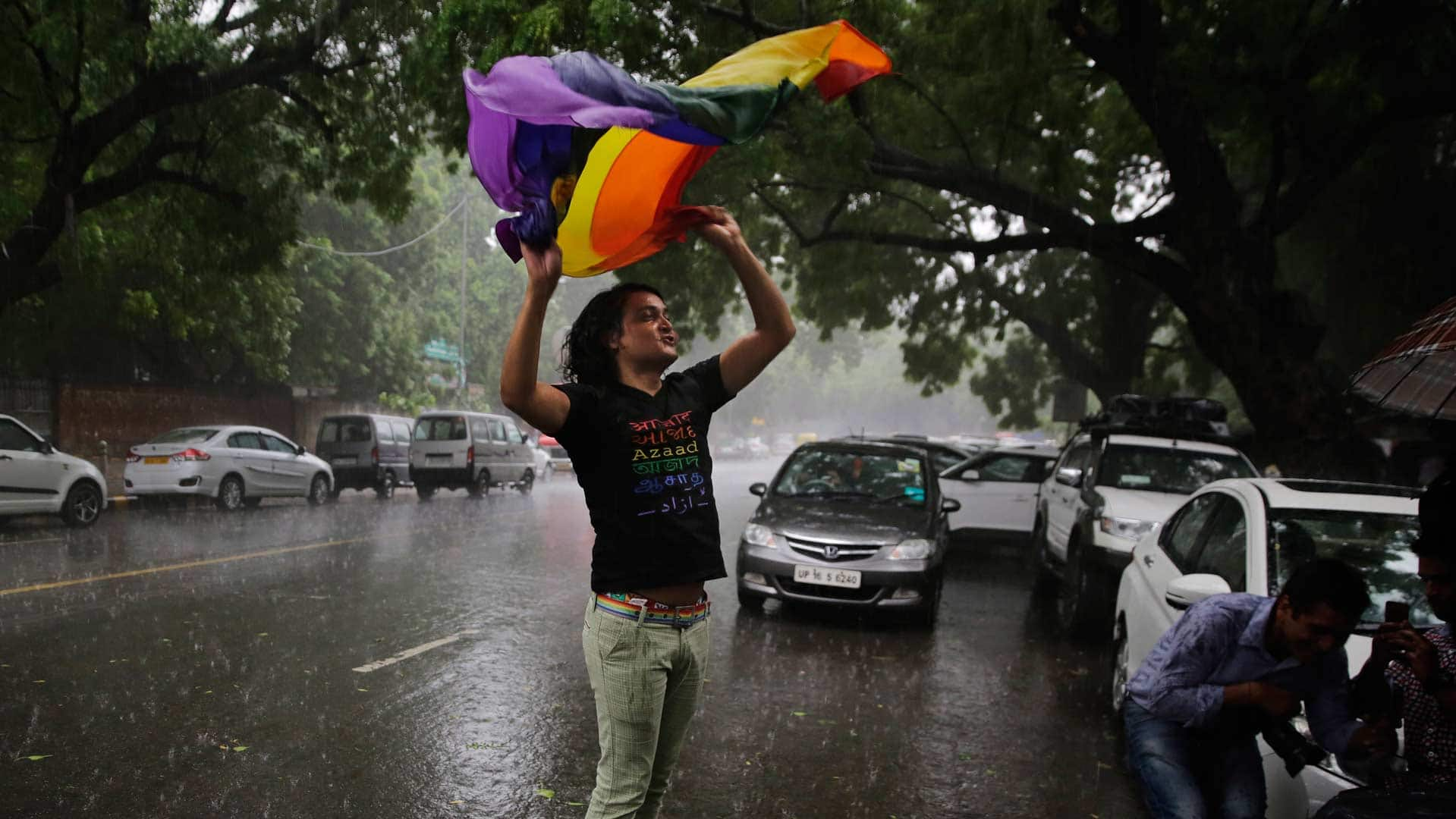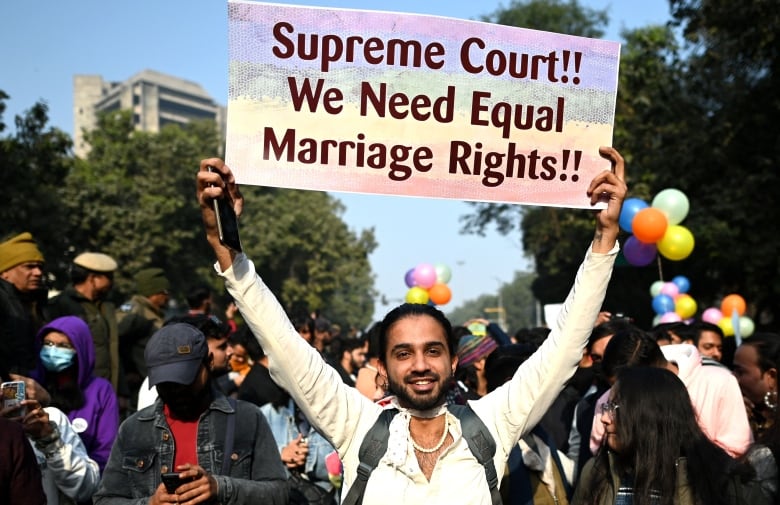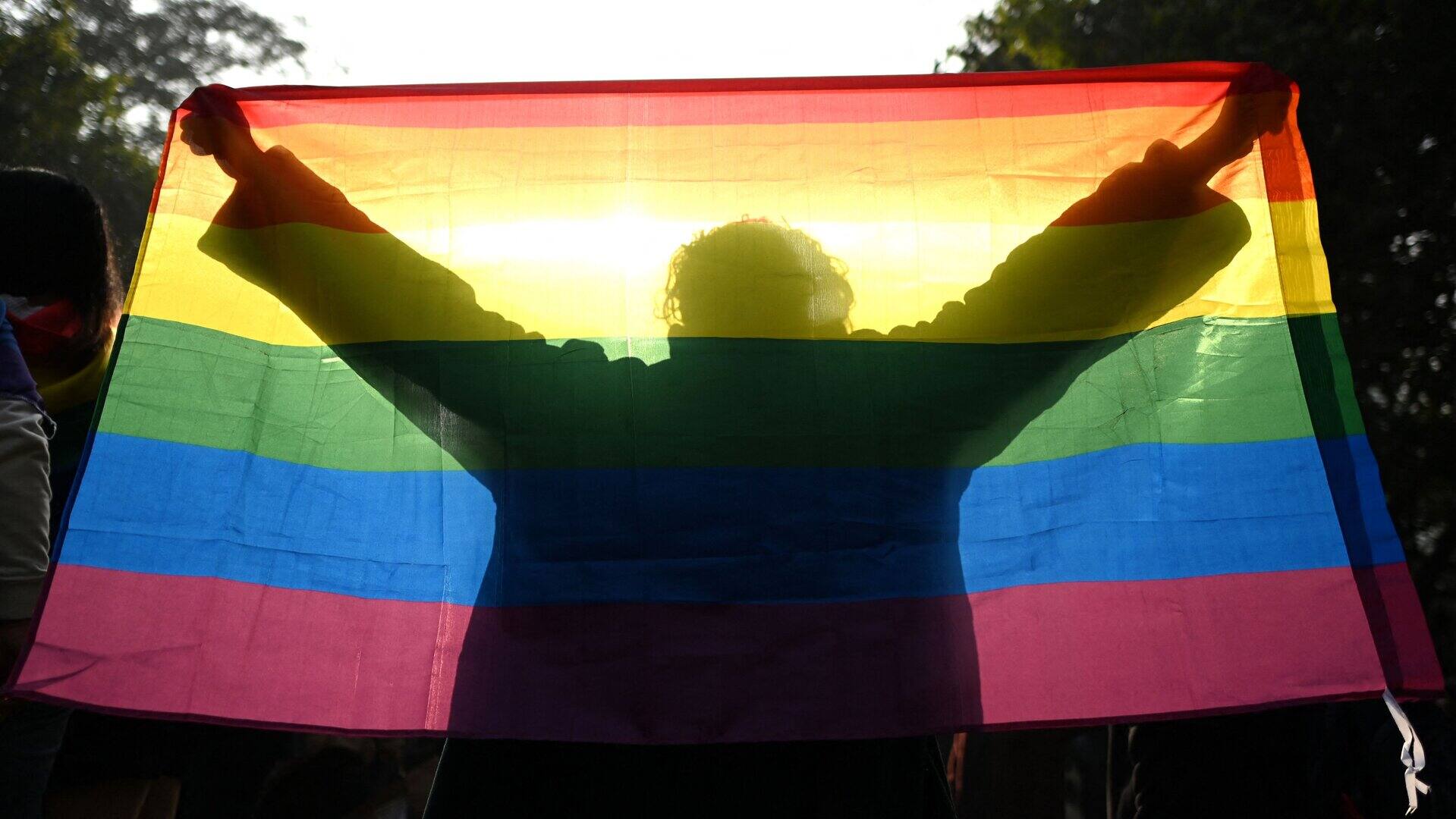Supriyo Chakraborty and Abhay Dang first connected on a dating website in December 2012, and they've been together ever since.
Over the next five months, the two men met each other's families and were accepted by them, and they moved in together. In 2021, they had a commitment ceremony to mark their ninth anniversary, with more than 100 friends and family — and their dog — attending to celebrate their love.
"We always wanted to get married because, in India, marriage is the main step that you take, you know, to make your relationship official," Dang told CBC News in an interview at the couple's home in Hyderabad.
Chakraborty described the affair as a "bouquet of different traditions" that combined a "beautiful fusion" of their heritages — Chakraborty is Bengali and Dang is Punjabi — with an exchange of vows and rings.
But no matter how much pride they take in their union, it was only a ceremony in the eyes of the law. It granted them none of the rights and privileges afforded to married couples of the opposite sex in India, such as making health-care decisions for one another or getting health insurance together.
The couple is fighting to change that. On Monday, the Supreme Court of India will begin hearing a collection of cases challenging the country's prohibition on same-sex marriage.
If the court rules in favour of legalizing same-sex marriage, it will be a landmark moment for LGBTQ people in India and the entire world.
The majority of the 32 countries and territories that have already enacted marriage equality laws are in the Americas and Europe — and, when it comes to religion, are predominantly Christian — so a positive outcome in India could influence laws elsewhere in the region.
Making the case
Chakraborty and Dang were one of two couples who initially petitioned the Supreme Court to change the law — the other is Parth Phiroze Mehrotra and Uday Raj Anand, a gay couple in New Delhi — but the number of petitioners has since grown, and the Supreme Court has also transferred several cases from other high courts, including those in Delhi and Kerala.
Their petition argues that India's Special Marriage Act, 1954 should allow same-sex couples to have the same legal right to marriage as opposite sex couples and that denying them that right violates several articles of India's constitution.
The Special Marriage Act solemnizes marriage outside of the religion or faith of either spouse, as opposed to unions registered under laws related to religious unions, such as the Hindu Marriage Act, 1955.
There is also the Foreign Marriage Act, which pertains to marriages overseas in which at least one spouse is Indian. (There are also petitions before the court to change each of those acts to permit same-sex marriage.)
The way the Special Marriage Act is written assumes the parties entering into a marriage are biological male and female and identify as such. It also refers to the "husband" and the "wife."
"[It] should be read as 'spouses' so that it encompasses people irrespective of their sex or gender identity," said Jayna Kothari, a senior advocate who practises in the Supreme Court and is the co-founder of India's Centre for Law & Policy Research. She is also representing three petitioners in one of the cases before the Supreme Court.
Courts in India have backed LGBTQ rights
India's government, led by Prime Minister Narendra Modi's Bharatiya Janata Party (BJP) since 2014, has refused to legalize same-sex marriage in the country of 1.4 billion people.
But the LGBTQ community may have an ally in the Supreme Court. Earlier court rulings on LGBTQ rights have helped pave the way to this moment.
"The courts are not bound by popular opinion," said Sukhdeep Singh, the founder and director of the Indian online LGBTQ magazine Gaylaxy. "They have to go by what the constitution says and ... [the] Supreme Court in India especially has taken [a] pro-people role in general."
The most recent victory was in 2018, when the high court decriminalized same-sex sexual relationships between consenting adults, ruling that the British colonial-era law that had been in place for 156 years was unconstitutional.
Kothari said that decision, although monumental, was just the start of eliminating discrimination against LGBTQ people and to fully recognize them as citizens. Marriage equality would be the next step.
"Decriminalization really does not have any meaning unless positive rights are granted," she said, explaining that includes the "right to have a family, the right to have property, the right to adopt."

Lack of rights brings brain drain
Political and societal changes haven't happened quickly enough for many LGBTQ Indians, who have opted to resettle in more progressive countries.
Saattvic, who goes by one name only, is an economist and a former actor in India's film and theatre industry. He said he grew weary of the "glacial pace" of improvements on LGBTQ rights and moved to Vancouver in 2020, along with his partner, Gaurav Bhatti, who is Canadian of Indian origin.
He said he thinks there are many other LGBTQ people like him — who are educated, experienced and have the means to leave India — and that not allowing same-sex marriage is contributing to a brain drain.
"These are the very people that will get up and go away if you don't give them equal rights, and that has ramifications for the economy as a whole," he said.
Saattvic said India is already paying a price for not advancing LGBTQ rights. He referred to a 2014 World Bank case study, titled The Economic Cost of Homophobia, that estimated India may be sacrificing up to 1.7 per cent of its GDP due to factors related to anti-LGBTQ discrimination.
Even though Saattvic and Bhatti could get married in Canada, the pair want to have a wedding ceremony in India in the presence of their families.
Saattvic joined the fight for marriage equality, petitioning the Delhi High Court in 2021 to change the Special Marriage Act, in one of the cases that has now been transferred to the Supreme Court.

He said he knows he's privileged to have been able to seek a better life outside of India, but he feels a sense of obligation to help the vast majority of LGBTQ people in the country who don't have such options.
"It's for those kids that live in the villages ... that don't have any way of expressing themselves. It's to give them a fair chance at a dignified life," he said.

Conservative pushback expected
A court decision allowing same-sex marriage is not likely to benefit everyone in the same way, cautioned Singh, of the magazine Gaylaxy.
"Even if the court decides, in a year or two, to legalize same-sex marriages, it's not going to be all hunky-dory," he said. "I think any social change takes a long time to get to a point or improve according to whatever the law says."
Women, especially those who are poor, face different struggles in Indian society, Singh said, while men "whether gay or straight, they have a lot of leeway."
He said he also expects pushback from more conservative politicians and religious groups if the Supreme Court legalizes same-sex marriage. One prominent BJP member of parliament, Sushil Kumar Modi (no relation to the prime minister), recently claimed that "same-sex marriage would cause complete havoc."
But Singh said he believes the case will have positive implications and could possibly influence legislation elsewhere in the region and around the globe.
India, the world's largest democracy and soon to be the planet's most populous country, could become just the second jurisdiction in all of Asia to legalize same-sex marriage, after Taiwan.

Chakraborty and Dang say the court battle has already made a difference, raising awareness about the legal rights same-sex couple are denied. But they have their eyes on a victorious outcome.
"When I'm on my deathbed and when I'm thinking about my life ... I think this will probably be the most proudest moment for me," Dang said. "If we are able to bring change in the law, if we are able to bring change in society."
Chakraborty said he is looking forward to the day his mother will be able to introduce Dang as her son-in-law.
"Rather than, you know, my son's friend."

















